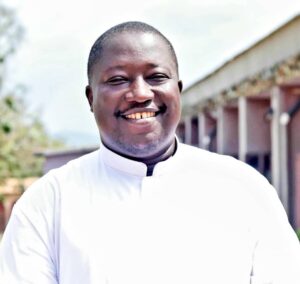“The Church of Pentecost Dedicates State-Of-The-Art Evangelism Gospel Truck”. This news headline, on March 20, 2023, attracted my attention and got me thinking about the difficulties Ghanaian Catholics are facing as we work toward establishing a National Catholic Television. This reflection served as the inspiration for my piece, “Catholic Media Evangelization in Ghana: All Hands on Deck.”
Catholic media evangelization is the practice of sharing the gospel and the Catholic faith through a variety of media, including print, radio, television, and social media. The objective is to spread Catholic teachings to as many people as possible, to increase awareness of the Catholic faith, and to encourage individuals to grow in their faith and relationship with God.
Catholic media evangelization is based on the idea that, in accordance with Our Lord and Saviour, Jesus Christ, the Church has a duty to share the Gospel with everyone (Matthew 28:19). The Church wants to reach people who might not otherwise have access to Catholic teaching or who might not be actively involved in the Church by using a variety of media to communicate the Catholic faith.

The Catholic Church has a long history of disseminating the gospel through media. Through conciliar documents, papal encyclicals, apostolic exhortations, and other publications. She has always advocated for the use of media in evangelization in recognition of the significance of media evangelization. For instance, in Rerum Novarum, a papal encyclical published in 1891, she emphasized the significance of the press in advancing Catholic social doctrine. The Church has continued to employ media ever since to spread its message throughout the world in a variety of ways. Pope Francis, who has been a prominent proponent of Catholic media evangelization, has also urged Catholics to convey the Gospel to the world and use social media to reach millions of people. Similarly, in his message for the 92nd World Missionary Day on the theme, “Together with young people, let us bring the Gospel to all, the Holy Father encouraged Christians to evangelize through encounters in the “digital world.”
The Church has continued to advocate the use of media to spread it message throughout the world in a variety of ways. This is also evident in the decree on Social Communications by the Second Vatican Council in 1963. Article 2 of the said document states that “the Church acknowledges that modern media, if correctly exploited, can be of immense service to humanity, as they considerably contribute to men’s entertainment and education as well as the spread and support of the Kingdom of God” (Inter Mirifica, 2).
The same document also emphasizes how important it is for Catholic media to be well versed in Catholic doctrine and to follow the Church’s teachings. The Church strives to make sure that its own teaching is adequately communicated through the media, which are crucial for influencing public opinion, according to the statement (Inter Mirifica, 14).
The last of such evidential proofs is contained in the publication by the Pontifical Council for Social Communications,” Communio et Progressio” 1971. In this publication the Church advocated for the use of media in evangelization. The publication stated that “the Church would feel guilty before God if she did not avail herself of those tremendous instruments which human talent is continually producing” (Communio et Progressio, 127).

The Catholic Church in Ghana has established a number of media outlets to spread the gospel after realizing the value of media evangelism. The Catholic Standard newspaper, for instance, offers news and analysis from a Catholic viewpoint. Other DEPSOCOM Offices across the nation, including DEPSOCOM Sekondi-Takoradi, DEPSOCOM Accra, DEPSOCOM Kumasi, DEPSOCOM Tamale, and DEPSOCOM Konongo -Mampong, are also pursuing programs in the media.
When Rev. Fr. Dieu-Donne Kofi Davor was appointed by the Bishops of Ghana to serve as the National Director for Social Communications, he expressed this call. He encouraged Catholics to participate in the media’s use as the main vehicle for information dissemination, stating, “It is true that the conventional media can undoubtedly reach a mass, but social media in this digital age can reach masses. Now that we have access to them, we may utilize them both for good and not for evil” (CANAA, 2016).
The Catholic Church in Ghana has made some attempts to create an active legacy and online presence. She, however, needs to do more to combine these platforms and interact with its members more meaningfully because current efforts are still insufficient and disjointed.
The Catholic Church in Ghana must invest in the creation of a thorough digital strategy that unifies all of its online platforms and projects, if it wants to fully realize the promise of, say, digital technology. Such a plan should be based on the Church’s mission and vision and prioritize the needs of its members, especially those who are located in the periphery.
Because it provides a potent and effective way to reach a large audience, especially people, who are frequently the most sensitive to the problems of the modern world, the Church in Ghana must embrace Catholic media evangelization.
The advantages of using the media to evangelize by the Catholic Church in Ghana means that we as Catholics cannot justify our failure at employing the media, be it traditional media or new media on the grounds of lack of capital or resources. The media is expensive, yes but the media also pays in terms of the benefits it provides. The joy of telling our own story should be motivating enough to encourage us to embrace the media. Our challenge as Catholics in Ghana and the use of media for evangelization is not a problem of content but a willingness to invest the needed capital to kick-start the project.
While acknowledging the various stakeholders’ contributions to the realization of the National Catholic Television agenda, it’s equally important to remind ourselves that most of our people are not welcoming the idea of buying an additional decoder to enable them access Catholic contents. These people are posing the question, “why can’t I have the Catholic television on my already existing decoder without buying a new decoder?”. The fact is we are already late in media evangelization and any attempt to penetrate that space must be holistic and aimed at directing the market to our favour.
Those who are arguing for the ability to access the Catholic television content on the multi-TV platform rather than through a different decoder should know about the financial contribution needed and what each Catholic can do to make it a reality.
The other churches who have embraced media evangelization are not wealthier than us, but rather because they understand its advantages and are willing to make the financial investment it requires. What we need to do as Catholics in Ghana is to come up with new ideas on how to raise the money necessary to realize this dream and be deliberate about the way forward.
If we fail to take advantage of the media landscape and realize this project, our Catholic faithful will be more susceptible to the false teachings of other churches whose doctrines are easily accessible through the media. A catholic media platform will provide Catholics the chance to foster dialogue and interaction with diverse religious communities in order to promote interfaith understanding and collaboration.
A Catholic television will go a long way in helping to address the issue of the Catholic Church in Ghana’s declining membership at a time when the church is searching for solutions. In order to give a platform for Catholic evangelization and outreach, the television project will be a potent instrument that can reach a large audience, including people who might not be able to attend church in person.
Also, the Catholic Church in Ghana will have a platform to provide catechetical and spiritual development resources, as well as educational programming that could help Catholics deepen their faith and understanding of Catholic doctrine. The Church has a great opportunity here to reach the entire nation and the world by using the media.

A Catholic television will provide the Catholic Church in Ghana a voice in the public realm and promote social justice and human rights problems in line with Catholic social teaching in a democracy that is developing like ours. It will also establish topics for discussion in the nation’s public conversation.
A project of this kind would provide some of our thronging Catholic youth with employment and training options in media and communications, which is important for the Church in a nation fighting the problem of youth unemployment.
To conclude, the Catholic Church’s mission to evangelize the world through the media is crucial to accomplishing this goal. It has been supported by the Church for more than a century and is based on the Scriptures. The Church in Ghana must adopt the Catholic media evangelization project because it provides a potent and effective way to reach a large audience at a time when we need to innovate in order to address the issue of declining membership and maintain an active presence and voice in the nation. The dream of bringing the Catholic faith and her teachings and practices into the homes, on the phones, tablets, and computers of our beloved Catholics, potential Catholics, and non-Catholics cannot therefore be defeated by a lack of funds or other resources.
By: Rev. Fr. Emmanuel Dolphyne (Director, DEPSOCOM Sekondi-Takoradi)


